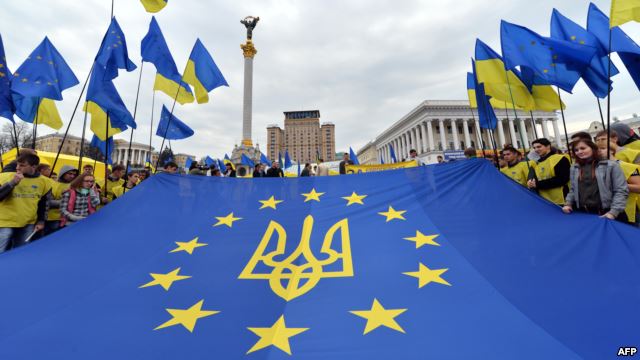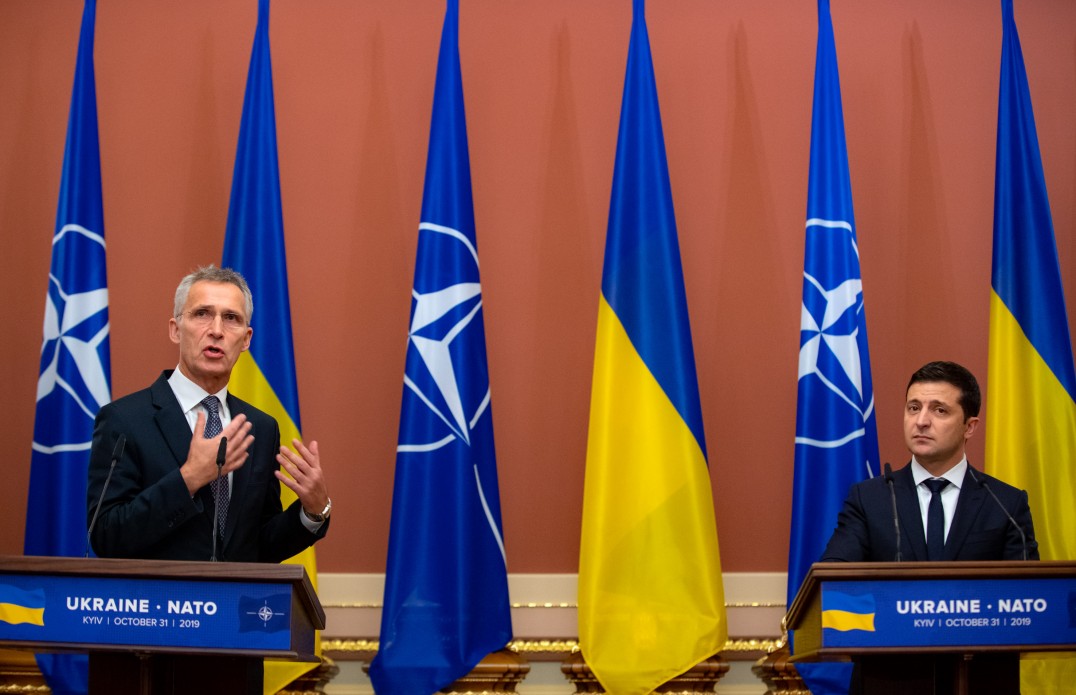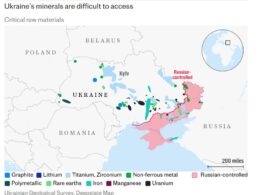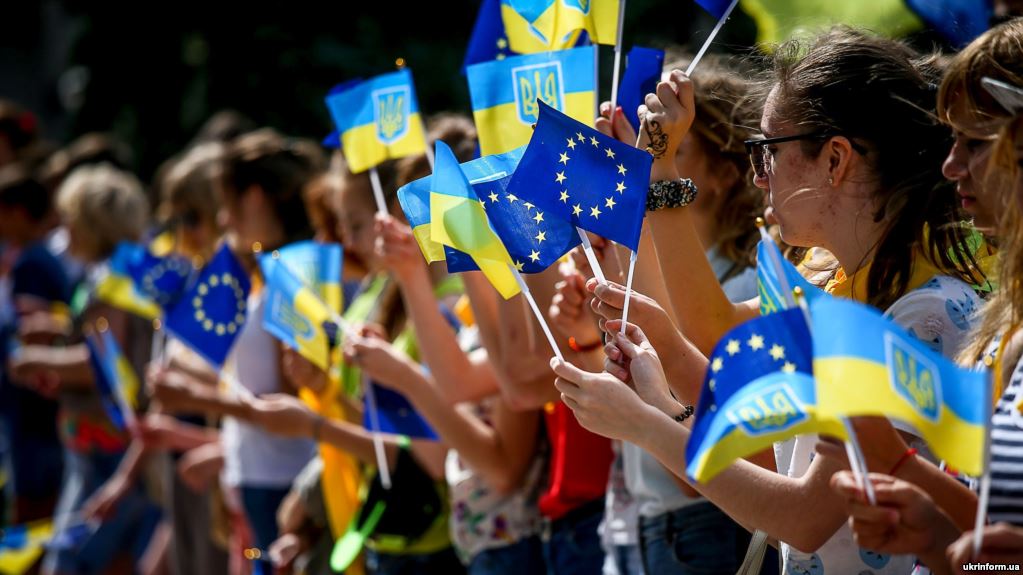2020… Ukraine applies for EU membership. Some more time goes by and this state becomes a full member of the European Union. From time to time Ukrainians preside over the union Council, their leaders go to Brussels regularly to present their positions at summits. The people live according to European norms and laws, having long-forgotten about the existence of visa borders, and take advantage of the merits offered by the free market of united Europe.
Neighboring Moscow’s reaction to these plans, scenarios and prognoses did not make us wait long: some of the Kremlin diplomat noted that without the regard for the Russian factor, the membership would not happen. High-standing Russian state official Vladimir Dzhabarov directly stated: the hope that the reform package announced by President Poroshenko under the title Strategy-2020 would prepare Ukraine to joining the EU is utopia.
But is it such a ‘utopia?’
The execution of all of these plans first and foremost depends on the Ukrainian’s ability to put their own home in order; this is the opinion that reigns among most European experts Radio Liberty interviewed.
In light of all current discussions regarding the suspension of the EU expansion process, the ‘tiredness’ from accepting new countries, Ukrainians should not lose hope: everything depends on them, emphasizes Nicu Popescu, head analyst at the EU Security Institute in Paris. The European capitals are skeptical about broadening the block on account of Ukraine, at least at the current stage.
“Not a single political step in the EU, in transport, industry or foreign policy, is unanimous at the beginning,” the political experts comments. “However, Europeans are always trying to agree, though sometimes it is difficult, and might last a long time. The same for Ukraine’s European future: at the moment there is no consensus, however there is no point in giving up and losing time. If within a couple of years, successful reforms are carried out in Ukraine, it might alleviate some of the skepticism towards Ukraine in terms of EU membership.”
There are other prospects after the association
The confirmations of this fact, vague as they are, even sound from EU leaders. Even though despite all the efforts of Ukrainian diplomats to insert a point on prospective EU membership into the Association Agreement test, the Europeans did not agree to it.
However, the most important thing is that today Ukraine is already working on the implementation of the Ukraine-Europe agreement, and the European Union considers this agreement to not be the last thing they can offer Ukraine.
“We just ratified and are working on the implementation of the Association Agreement very intensively,” emphasizes Peter Stano, spokesman for EU Commissioner for Expansion Štefan Füle. “So Ukraine will be able to feel the advantages of economic and political closeness with Europe, and the reforms which are being approved or which are yet to be approved will be useful to them.”
“Meanwhile the EU states that association is not the end goal of our cooperation,” the EU Commission representative emphasizes.
The economy to the free market
A number of experts emphasizes Ukraine’s current negative image as a deeply corrupt country with a weak economy and bad structure; the reputation the country has ‘gained’ throughout its years of independence. It is a big negative point for its European future, which will be difficult to cancel out.
In particular, such is the opinion of Mark Franco, head analyst at the Egmont Royal International Relations Institute in Brussels. To his mind, the President who announced reform will not find it easy to combat corruption and bad political leadership, “in particular, because of the resistance the old faces in politics will pose to Ukraine’s transition to a truly democratic mechanism.”
Other experts from European analytical centers note that the discussion regarding Ukraine’s prospective EU membership would be made much easier by Kyiv’s demonstrating its seriousness regarding modernization and reconstruction. In this sense, they offer an example: let us suppose that after the Orange Revolution the Ukrainians had received a promise of EU membership. Yushchenko and Tymoshenko, instead of working for the country, would have engaged in their own office conflicts, and the country would not have moved towards European standards still. Would this prospect have changed anything? Of course not, experts say.
Therefore united Europe does not guarantee anything to anyone in terms of future membership.
Everything is in Ukraine’s own hands
Nobody had promised Lithuania, Hungary or Romania membership in the union. However, they gained membership thanks to relatively broad reforms and increasing living standards to the European level.
“Even by looking at recent history, despite the debates on Europe’s so-called ‘tiredness’ from expansion, Croatia joined the block last year. Therefore, everything depends on Ukraine’s reform and modernization,” representative of the French analytical center Nicu Popescu emphasizes. “Its European prospect is in its own hands. Everything will be decided depending on how the government of the country and the political class deal with the problems that led the country to the current crisis and corruption.”
Another important factor: the economic criterium for joining the EU states that the economy of a candidate country has to develop towards the market which functions concordantly and which is able to withstand competition. In this sense, Brussels-based analyst Mark Franco, who had worked for the EU Commission diplomatic corps for a long time, emphasizes that within the past two decades the political-oligarchical groups who ruled the country, “led to the sclerosis of the Ukrainian economy,” to constant lack of growth and development. Therefore the current government is posed with the task of “freeing and demonopolizing the economy and establishing free market game rules.”
The Russian factor in Ukraine’s EU membership
Egmont Royal International Relations Institute representative Mark Franco also points towards another important factor: Russia. To his mind, Kyiv should take special care with this challenge. In the east and south of Ukraine, with Russia’s support, there is a risk that a new frozen conflict might emerge. This should be taking into account in preparation for EU membership, having established relations with Russia in a correct way.
“Joining the EU cannot be exclusive, so Ukraine should not break ties with Russia, as they are developing relations with the West,” the expert assures. “It is not easy, but Ukraine has a great advantage, as it is located between Russia and the European Union. It can receive benefits from both sides. Which is why the current Ukrainian government faces a challenge: deeper European integration cannot damage and decrease relations with Russia.”
Meanwhile Moscow’s aggressive policies, evoked by Ukraine’s will to break with the burden of its Soviet past and develop following the European model, is constantly criticized by the democratic world. EU institutions, such as the EU Commission, the EU Parliament or the EU Council, when addressing the Kremlin, do not tire to say: the way Ukraine has chosen for itself is its sovereign right, and it is unacceptable to impose development models on Ukraine from the outside.
The only thing left is to hope that the government of Ukraine’s big neighbor on the other side of the continent will one day grow tired of preventing Ukraine from turning the ‘utopia’ of European membership into reality.





